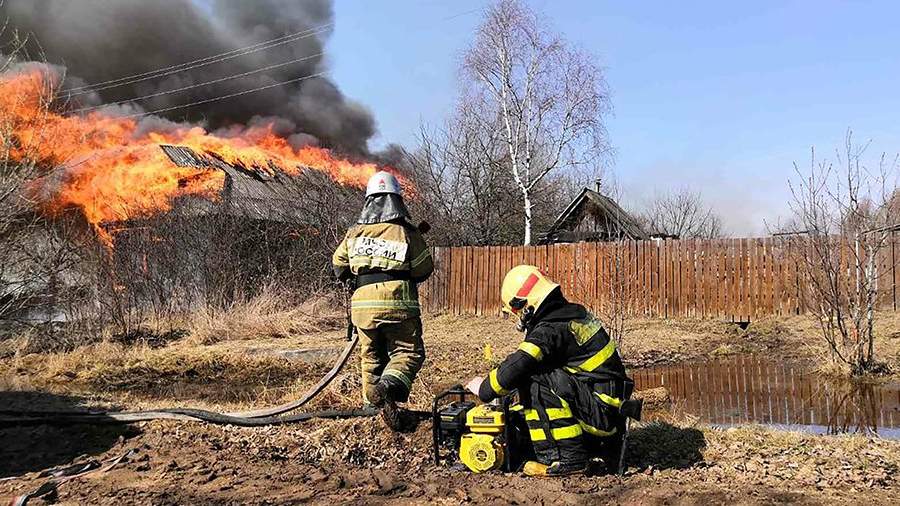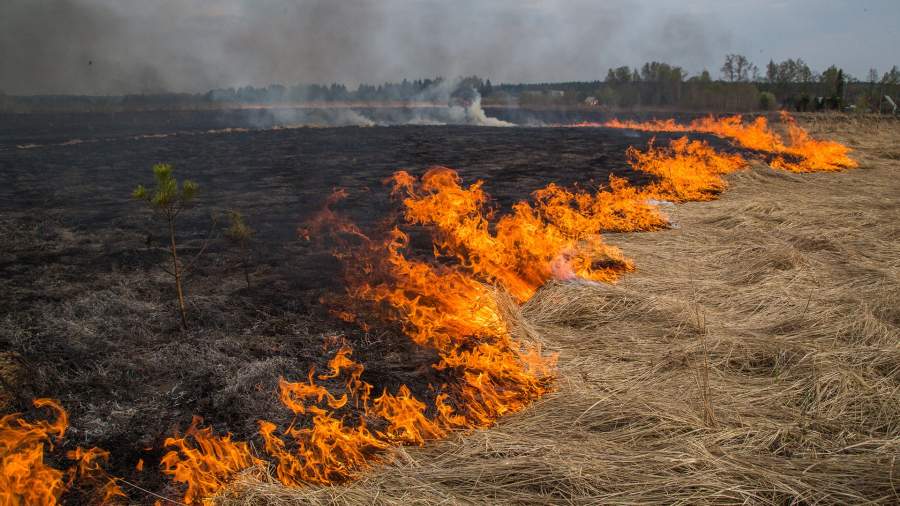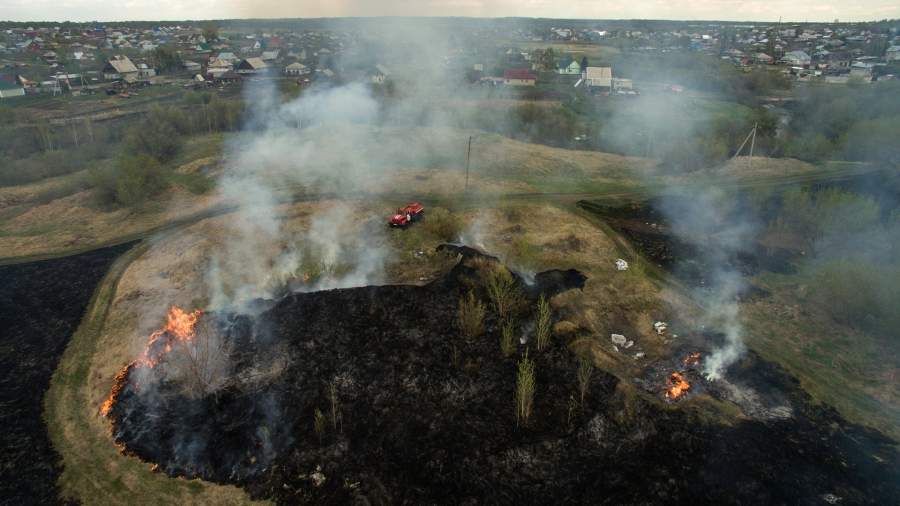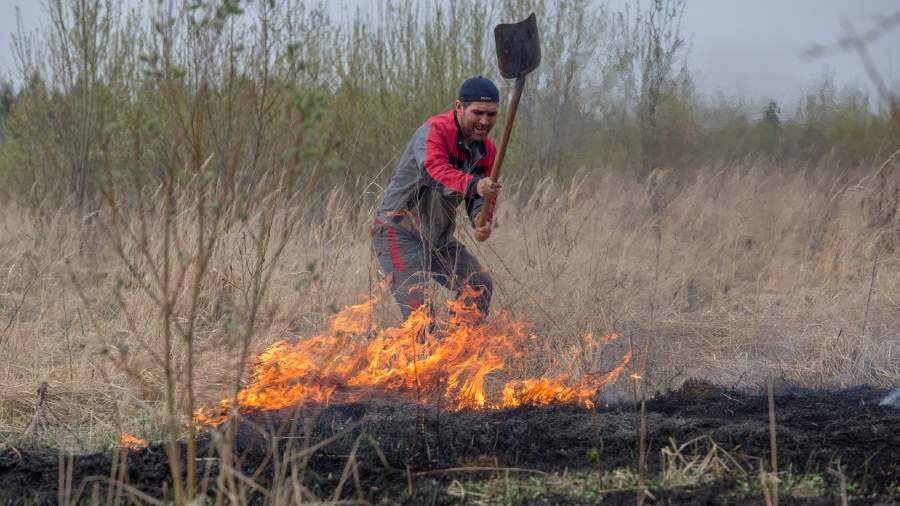In recent days, serious fires have occurred in a number of regions of Russia due to the fallen grass. In the Tula region, the fire almost spread to a kindergarten; in Vladimir, 11 houses burned down due to a fire in a field. The grass, and with it forests and buildings, burn everywhere and every year, but the measures taken, apparently, are not enough. Details – in the material “Izvestia”.
Table Of Contents
Houses lit up in one
On Thursday, as a result of an unauthorized fall of dry grass in the village of Pershkovo near Gus-Khrustalny in the Vladimir region, houses caught fire.
– At 12:01 a message was received via the 112 system about the fire in a private residential building in Pershkovo– said Pavel Litov, Deputy Head of the Main Directorate of the EMERCOM of Russia for the Vladimir Region, at a briefing on Friday. – We dispatched two tankers to check the call. At 12:02 – a message that three houses are already on fire.
As a result, about 13 buildings caught fire, including residential and country houses. A Mi-8 helicopter was involved in the extinguishing.
– Subsequently, they examined the site of the fire, found that the houses began to catch fire after only one, – said Litov. “The heat flows were just huge, and the temperature was high outside, and the tree was piled up near the houses.
Open burning was eliminated at 15:20. No one was hurt, but some of the villagers were homeless. The issue of their resettlement has already been resolved. In total, there are 77 houses in Pershkovo, of which 34 are residential and 30 are summer cottages. Four residential and six country houses were destroyed, the rest of the lost buildings were uninhabited.
A special fire-prevention regime has been in effect in the Vladimir region since Friday. The Ministry of Emergency Situations explains: cases of fire transfer from dry grass to buildings were recorded in Murom, Kameshkovsky, Kirzhachsky, Kovrovsky and Gus-Khrustalny districts. During the day, 53 grass fires occurred in the region…
It’s not just the villages that are on fire. In the Tula region, because of the grass fell, the fire reached the paintball club “Tula Legion”, in the same region in the city of Novomoskovsk, the flame from a field on fire almost spread to a kindergarten…
Only from the flanks
At the same time, as noted in the Main Directorate of the Ministry of Emergency Situations in the Vladimir region, extinguishing grass, if there is no threat to the settlement, is the authority of local government bodies. Rescuers go to such fires only if there is an immediate threat of danger to houses and residents.
– When dry weather sets in homeowners, SNT participants, summer cottages, local government owners and forest workers should make plowing, breaks and stripes in continuous litter and dry grass to prevent fire from spreading to garden plots and houses, – told “Izvestia” expert on emergency situations of the movement “Strong Russia”, Colonel of the internal service Alexander Podgrushny. – Patrols are posted, in the yards and in the areas – barrels of water, brooms to overwhelm the fire, and so on. The fire brigade is called as a last resort when they themselves cannot cope.
Podgrushny notices that in this situation, great attention should be paid to the training of firefighters.
– A classic and widespread tactical mistake – attacking a fast moving grass fire from the front with a fire engine– he told Izvestia. – Machines in such conditions operate only from the flanks.… Even professionals cannot always anticipate the course of a fire.
It is more profitable to burn
For violation of fire safety rules, administrative liability is provided under article 20.4 of the Administrative Code. Alexander Ushakov, a lawyer of the Moscow collegium of lawyers “Arbat”, notes that in conditions when there is no fire-prevention regime on the territory, fines are stipulated in the amount of up to 3 thousand rubles for citizens, for officials – up to 15 thousand, for individual entrepreneurs – up to 30 thousand rubles, for legal entities – up to 200 thousand. In addition, during a special fire safety regime for legal entities, it is also possible to punish them in the form of suspension of activities for up to 30 days.
– Responsibility for violation of fire safety requirements that resulted in a fire and serious harm to human health or death of a person is established in accordance with Part 6.1. Art. 20.4 of the Administrative Code of the Russian Federation, only for legal entities, – he told Izvestia.
Ushakov explains: if property is destroyed as a result of burning dry grass, it is possible to initiate a criminal case and compensate the culprit for material damage in full.
Here the methodology of the Ministry of Natural Resources for the calculation of damage operates. In this regard, one high-profile case has already been: In February, the Department of Environmental and Hunting Supervision of the Belgorod Region sent a pre-trial claim to Andrey Lipatov, a resident of the Korochansky District, demanding to pay off the damage of 17 million rubles caused by a fire that occurred through his fault… The fire occurred in October 2020 – Lipatov burned dry vegetation on his land plot, but was not convinced that he extinguished the fire, and it got out of control… Burned down 3 hectares. Lipatov himself, as reported in the media, works as a loader and receives 13 thousand. The fine has not yet been paid, and litigation is likely to come.
However, Lipatov’s story is the exception rather than the rule.
– We need a normal control mechanism, but it really does not exist, such cases are very reluctant to investigate– said Konstantin Kobyakov, coordinator of projects on high conservation value forests of WWF Russia, to Izvestia. – Only in obvious cases, when someone saw the moment when the grass was set on fire and complained, recorded it, then punishment is possible. But a full-fledged investigation into each case is not even close.
Alexey Yaroshenko, head of the forestry department of Greenpeace in Russia, noted that the fines are so small and the likelihood of getting caught is so low that it doesn’t stop anyone. At the same time, he says, the system of fines is designed in such a way that it forces the owners to drop the grass.
– If you have dry grass on the site, you will be fined. If you set fire to the grass, they will also be fined, – said Yaroshenko. – But it is more profitable to burn this herb. Because he will definitely be fined for dry grass if the fire department gets there, and for what he burned, the probability is very small.
– In all cases, the responsibility is borne by the person who set fire to the grass.– notes Maria Spiridonova, a member of the Russian Lawyers’ Association. – For several years now, the Ministry of Emergency Situations has been advocating tougher punishments for deadwood arsonists, since the currently envisaged sanctions do not properly affect arsonists. And sometimes they are not brought to justice at all if it is not possible to establish the persons who committed the fall.
She notes that volunteers sometimes help to find the culprit. As an example, he cites a story from Khakassia: there, inspectors, together with volunteers, using a drone, discovered arson, recorded who was setting fire to where, and arrived at the scene. It turned out that the culprit was the owner of the camp site, who, despite the introduction of a special fire regime, set fire to dry grass around his buildings with a gas burner.
Ushakov believes that to reduce the number of emergencies, it is necessary to tighten liability measures for individuals. According to him, formally punishment exists, but in reality it is impossible to put a police officer next to every citizen with matches, just as it is impossible to take every arsonist to court.
That’s right – it’s expensive
At the same time, it is the uncontrolled grass fall that is prohibited. Burning dry grass in itself as a way to clear the field from dry grass in Russia is not prohibited and for a long time it was not regulated at all. Only in October 2019, the Ministry of Natural Resources first established the rules for burning dry grass on the lands of the forest fund.
Six months later, WWF declared that this was not enough – and it was necessary to introduce a complete ban on any burning of dry grass, including preventive burning.
“Our position really gradually leaned towards the need for a complete ban on burning dry grass,” Kobyakov told Izvestia. “In theory, these prophylactic burnouts can be of some benefit if done correctly, but the key here is“ doing it right ”. This is almost never done anywhere.
Correct prophylactic burnout is still very expensive, Kobyakov notes. In this situation, in his opinion, it is wiser to get rid of dry grass by other methods: mowing, plowing.
– Correct burning also suggests that you still need to do a plow, that you need to have a certain number of people who will control the fire, – Kobyakov notes. – It’s pretty expensive. Now, more often than not, they threw the match and left, hoping for spring: the forest is wet, the fire will not go there. And even if he leaves, no one will be punished anyway.
The more often, the more dangerous
Both Kobyakov and Yaroshenko also point out that preventive burnouts are, in fact, advertising fires for the population.
– Foresters and municipal organizations produce fallen grass, and then they say: oh, you have to be careful with fire in the forest, – said Yaroshenko. – Nobody takes these words seriously, because people see that they can burn.
At the same time, preventive burnouts, they point out, lead to an increase in the fire hazard.
– Each burning out forms as a result more fire hazardous vegetation, – Kobyakov noted. – The more often the territory is on fire, the higher the fire hazard on it – if we take a long-term perspective, and not the next season. More fire hazardous areas are being formed.
Yaroshenko notes: this especially applies to Siberia and the Far East, where the areas of professional combustion are huge.
“The more open the area, the fewer bushes and trees on it, the smoother and faster it dries in the sun, the more grass grows there, and this is the most flammable material,” he notes. – And fire spreads the fastest in such territories by the wind.
Kobyakov notes: the experience of other countries shows that there are practically no fires where they have abandoned any fire on the farm. This is the case, for example, in the Scandinavian countries. At the same time, even in rich countries, for example, the USA and Australia, where fire is used for economic purposes, fire disasters still occur.
Izvestia sent a request to the Ministry of Natural Resources on the position on a possible complete ban on preventive burning, as well as to the Ministry of Emergency Situations regarding further measures to prevent grass fires.




